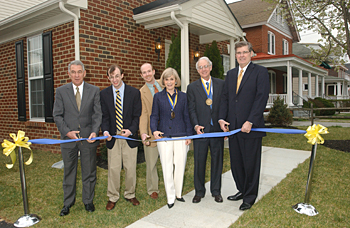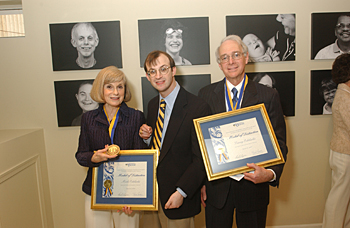
The home is part of the Total Life Project, a model demonstration transition project developed by UD's Center for Disability Studies. The mission of the project is to enhance the quality of life of individuals by promoting empowerment, choice, community inclusion, independence and pursuit of personal, vocational, residential and recreational goals, Michael Gamel-McCormick, interim chairperson of the Department of Individual and Family Studies, director of the Center for Disabilities Studies and professor of individual and family studies, said.
During the dedication ceremony, Howard E. Cosgrove, chairman of the Board of Trustees, presented University of Delaware Medals of Distinction to the Edelsohns, who have been raising funds to assist individuals with disabilities for the last three decades.
“The Edelsohns exemplify the true meaning of philanthropy--the act of altruistic giving toward social need that is not served, underserved or perceived as unserved or underserved,” Cosgrove said. “An old Chinese proverb perhaps sums up best what is behind the Edelsohns' commitment. It is, and I quote: 'Being deeply loved by someone, gives you strength; loving someone deeply, gives you courage.'”
The Edelsohns previously obtained $1 million in donations to endow the Robert Edelsohn Chair in Disabilities Studies at the University. Steven M. Eidelman, former executive director of The Arc of the United States, the primary national organization of and for people with cognitive and related developmental disabilities, was named UD's first Robert Edelsohn Chair in Disabilities Studies in 2005. The chair is named for the Edelsohns' son, who lives in a similar group home in Wilmington.

UD President David P. Roselle thanked the Edelsohns for their tireless efforts and said: “As you can well imagine, it takes funding, and lots of it, to provide the right facilities and resources, both in operating and personnel resources, to initiate a successful program. It takes additional funding to maintain the standards of providing the best living, working and supportive environments for these young people for better integration in the years to come. And, within the mission of the University, it takes support to integrate a program like this with the undergraduate and graduate preparation programs that prepare students to be the professionals who work with persons with developmental disabilities.”
The brick-front house, which will accommodate four participants, has three two-room suites, each equipped with a refrigerator, toaster and microwave oven. A full kitchen and commons area for the use of all participants is also available. The first participants will move into the house in the fall.
Article by Martin Mbugua
Photos by Duane Perry


